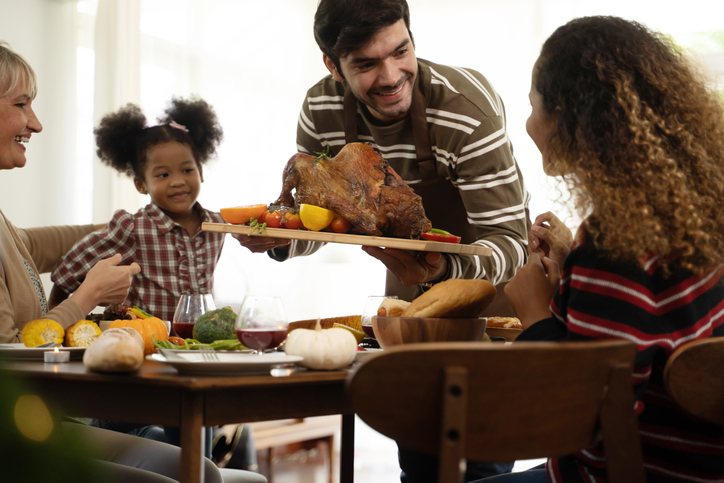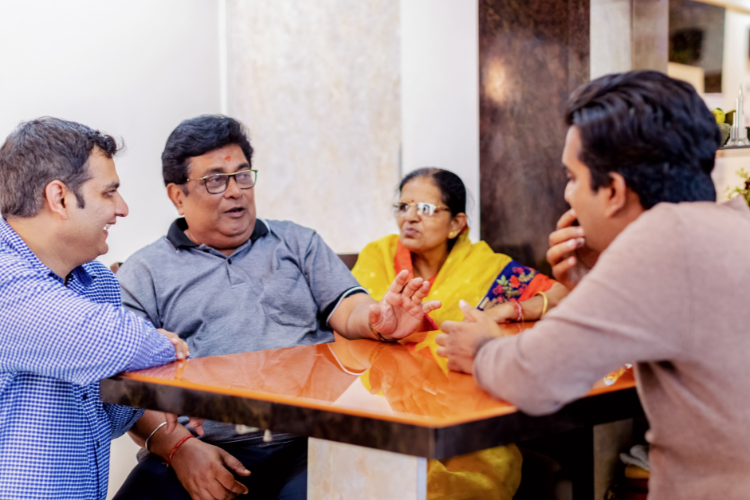Back Together with Gratitude: Managing your emotions and expectations during the holidays
 Last year in 2020, you might have hosted or attended small holiday gatherings, if any. Some were in-person, and some were virtual. Overall, it was different, and this year will feel different yet again. Thankfully, we have Covid-19 vaccines, our favorite masks on hand, and more hope for safer gatherings. But is the idea of getting together with family causing some anxiety? Returning to social events isn’t easy, and it might take some practice until you feel comfortable with it again. Conversations these days can also get pretty heated, and emotions could run wild. Covid-19 is still a concern as well. So how can you navigate challenging conversations, stay safe and still enjoy the festivities? Here are a few tips to consider for managing your emotions and expectations during family gatherings over the holidays.
Last year in 2020, you might have hosted or attended small holiday gatherings, if any. Some were in-person, and some were virtual. Overall, it was different, and this year will feel different yet again. Thankfully, we have Covid-19 vaccines, our favorite masks on hand, and more hope for safer gatherings. But is the idea of getting together with family causing some anxiety? Returning to social events isn’t easy, and it might take some practice until you feel comfortable with it again. Conversations these days can also get pretty heated, and emotions could run wild. Covid-19 is still a concern as well. So how can you navigate challenging conversations, stay safe and still enjoy the festivities? Here are a few tips to consider for managing your emotions and expectations during family gatherings over the holidays.
1. Decide on your COVID safety guidelines in advance
Take time to think about what you’ll need to feel safe during the holiday season. When do you want to wear a mask? What types of events are you comfortable attending? Talk to your host about the plan for dealing with COVID safety for the day. People have differing levels of comfort and varying beliefs about COVID. Is there an agreement about vaccinations and/or testing before gathering? Then talk with your partner and your kids about your goals and strategies during Thanksgiving get-togethers.
2. Expect intense emotions
 If you haven’t been together with people you love in a long time, your gathering is bound to be emotional. Feelings will run high as people bring their excitement, desire for connection and intentions to catch up. There may also be some anxiety. Excitement and anxiety are two sides of the same coin: the brain processes them along similar pathways. Expect emotional ups and downs, and strategize how to cope with them in advance.
If you haven’t been together with people you love in a long time, your gathering is bound to be emotional. Feelings will run high as people bring their excitement, desire for connection and intentions to catch up. There may also be some anxiety. Excitement and anxiety are two sides of the same coin: the brain processes them along similar pathways. Expect emotional ups and downs, and strategize how to cope with them in advance.
3. Practice self-care
Let’s face it, families can be challenging. You may have great hopes for the holiday which are dashed by a thoughtless comment from your mother or an inappropriate “joke” by your uncle. You may become overwhelmed by the stimulation and have trouble processing all of the input. Think about what you can do to stay centered and calm in advance of the gathering. Schedule some time you’ll take a walk, do some yoga, meditate, grab a break or read your book during the day.
4. Appreciate what you have

Make time at the table to give thanks–for your health, being together, the food you have, your home. It’s been a rough 18 months, and our lives have changed dramatically. Talk with your kids about what has gone well and lessons they’ve learned from what you have all experienced. This teaches them to appreciate what they have instead of focusing on what they don’t. You will decrease negativity and increase positive thinking, which assists children and teens with practicing gratitude.
Celebrating holidays can be difficult as we navigate family dynamics, the stress of travel and competing priorities. It’s possible to relieve some of the pressure by planning ahead and carving out time to unwind. In the spirit of Thanksgiving, practice gratitude and emphasize the good instead of dwelling on the bad. Lift your own spirits by acknowledging what you’re thankful for, and help spread positive feelings among your family and friends.
Wishing you and your family a safe and happy Thanksgiving!
Read more blog posts:
- ADHD and Metacognition: Learning to reflect on your thoughts and experiences with a growth mindset
- Planning and Prioritizing Practices for ADHD Brains: What’s the plan, and when do you start?!
- Create Successful Neurodiverse Family Outings Today: Time to connect with the great outdoors!
Watch on Dr. Saline’s YouTube Channel:
- Transforming ADHD Triggers: From Upset to Reset (ADDitude Live Q&A with Dr. Saline)
Dr. Saline’s Interviews & In the News:
- Mentally Preparing for the Chaos that Can Come From Family and Friends (WWLP 22 News Interview with Dr. Saline)
Deeper Dive: https://drsharonsaline.com/product/home-seminar/
